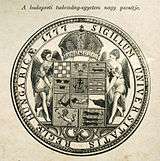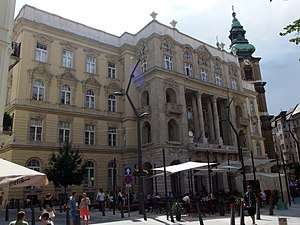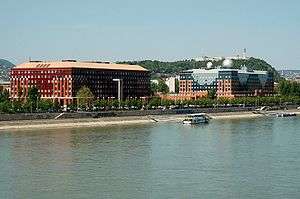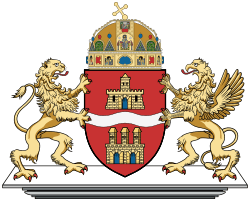Eötvös Loránd University
 | |
| Latin: Universitas Budapestinensis de Rolando Eötvös nominata | |
| Motto | Community of Knowledge |
|---|---|
| Type | Public research university |
| Established | 1635 |
| Affiliation | |
| Chancellor | Dr. Gyula Scheuer |
| Rector | Barna Mezey, D.Sc |
Academic staff | 1,800[1] |
| Undergraduates | 16,017[2] |
| Postgraduates | 8,547 |
| 1,442 | |
| Location |
47°29′26″N 19°03′31″E / 47.4906°N 19.0585°ECoordinates: 47°29′26″N 19°03′31″E / 47.4906°N 19.0585°E |
| Campus | Urban |
| Website |
www |
Eötvös Loránd University (Hungarian: Eötvös Loránd Tudományegyetem, ELTE) is a Hungarian public research university based in Budapest. Founded in 1635, ELTE is one of the largest and most prestigious[3] public higher education institutions in Hungary. The 28,000 students at ELTE are organized into eight faculties, and into research institutes located throughout Budapest and on the scenic banks of the Danube. ELTE is affiliated with 5 Nobel laureates, as well as winners of the Wolf Prize, Fulkerson Prize and Abel Prize, the latest of which was Abel Prize winner Endre Szemerédi in 2012.
The predecessor of Eötvös Loránd University was founded in 1635 by cardinal Péter Pázmány as a catholic university for teaching theology and philosophy. In 1770, the University was transferred to Buda. It was named Royal University of Pest until 1873, then University of Budapest until 1921, when it was renamed Pázmány Péter University after its founder Péter Pázmány. The Faculty of Science started its autonomous life in 1949 when The Faculty of Theology was separated from the university. The university received its current name in 1950, after one of its most well-known physicists, Baron Loránd Eötvös.
History

The university was founded in 1635 in Nagyszombat, Kingdom of Hungary, (today Trnava, Slovakia) by the archbishop and theologian Péter Pázmány. Leadership was given over to the Jesuits. Initially the university only had two colleges (College of Arts and College of Theology). The College of Law was added in 1667 and the College of Medicine was started in 1769. After the dissolution of the Jesuit order, the university was moved to Buda (today part of Budapest) in 1777 in accordance with the intention of the founder. The university moved to its final location in Pest (now also part of Budapest) in 1784. The language of education was Latin until 1844, when Hungarian was introduced as an official language. Women have been allowed to enroll since 1895.[4]
Campus


Lágymányosi campus
The Lágymányosi campus is home to the Faculty of Science, the Faculty of Informatics and the Faculty of Social Sciences. The campus is located in the 11th district of Budapest.
SAVARIA Campus
The Savaria Campus is created for producing best Mechanical Engineers. Only Mechanical Engineering courses are conducted here with modern facilities of labs and work shops. Furthermore, It has great industry collaboration with industry to make sure advanced Mechanical Engineering studies. Dual education system of mechanical engineering are available here. The principal goal of the dual education system is to synchronize the requirements of higher education and the job market. This education system is implemented by reforming a traditional Mechanical Engineering BSc program based on its professional practical background.
Academic profile
ELTE is Hungary's largest scientific establishment with 118 PhD programs at 17 doctoral schools, and also offers 38 bachelor's programs, 96 master's programs, and over 50 degree programs in foreign languages. The course credits awarded are transferable to universities in Europe through the Bologna process.[5]
The eight faculties are:
- Faculty of Law and Political Sciences (ÁJK)
- Bárczi Gusztáv Faculty of Special Education (BGGyK)
- Faculty of Humanities (BTK)
- Faculty of Informatics (IK)
- Faculty of Education and Psychology (PPK)
- Faculty of Social Sciences (TáTK)
- Faculty of Elementary and Nursery School Teachers' Training (TÓK)
- Faculty of Science (TTK)
Reputation and rankings
| University rankings | |
|---|---|
| Global | |
| ARWU World[6] | 301-400 |
In the 2013-14 QS World University Rankings, Eötvös Loránd University was ranked 551-600th. In the 2018, according to the Times Higher Education World University Ranking, ELTE ranked between 601-800. Academic Ranking of World Universities ranked the university among the best 301-400. International Colleges and Universities ranked the university as the 158th globally.
Notable alumni

Nobel prize winners:
- Lénárd Fülöp, Nobel Prize for Physics (1905)
- Albert Szent-Györgyi, Nobel Prize in Physiology or Medicine for the discovery of Vitamin C (1937)
- Hevesy György, Nobel Prize for Chemistry (1943)
- Békésy György, Nobel Prize in Physiology or Medicine (1961)
- Harsányi János, Nobel Memorial Prize in Economic Sciences (1994)
Other notable alumni:
- Miklós Ajtai, computer scientist; Knuth Prize (2003)
- József Antall, Prime Minister of Hungary, 1990-1993
- László Babai, mathematician and computer scientist; Knuth Prize (2015)
- Wilhelm Bacher, Jewish Hungarian scholar, rabbi, Orientalist and linguist
- Albert-László Barabási, physicist, concept of scale-free networks, C&C Prize (2008)
- Franz Anton Basch, Nazi executed for war crimes
- Therese Benedek, Hungarian-American psychoanalyst
- Károly Bezdek, mathematician
- Christine L. Borgman, information science researcher and educator
- Gyorgy Busztin, ambassador and UN diplomat
- Zoltán Dörnyei, applied linguist
- Ahn Eak-tai, Korean classical composer
- Paul Erdős, mathematician
- Péter Esterházy, novelist
- Jenő Fuchs (1882–1955), four-time Olympic champion fencer
- Laszlo Garai, scholar of psychology
- Peter G. Gyarmati, computer scientist
- István Gyöngy, mathematician
- Pál Schiller Harkai, philosopher and psychologist
- Ágnes Heller, philosopher
- John Harsanyi, Nobel Memorial Prize in Economic Sciences (1994)
- Zsuzsanna Jakab, Director of the World Health Organization's Regional Office for Europe
- Antal Jákli, liquid crystal physicist
- László Kákosy, egyptologist
- László Kalmár, mathematician
- Karl Kerényi, scholar in classical philology, co-founder of modern studies in Greek mythology
- Fritz Klein (1888–1945), Nazi SS doctor hanged for war crimes
- Judit Kormos, applied linguist
- Andras Kornai, mathematical linguist
- Radó von Kövesligethy, physicist, astronomer and geophysicist, developer of "Kövesligethy´s spectral equation" (1885)
- Ferenc Krausz, physicist, founder of attophysics, director at the Max Planck Institute for Quantum Optics (2003)
- Miklós Laczkovich, mathematician
- Cornelius Lanczos, mathematician
- László Lovász, mathematician, Knuth Prize (1999), Bolyai prize (2007), Kyoto Prize (2010)
- Ioan Lupaş, historian, academic, politician, Orthodox theologian and priest
- Iuliu Maniu, 32nd Prime Minister of Romania (1928–1933)
- László Mérő, research psychologist and popular science author
- Ingo Molnár, Linux kernel developer
- Péter Molnár, scholar of communication law and speech
- Krisztina Morvai, MEP (Jobbik party) and lawyer
- Teodor Murăşanu, Romanian writer and teacher
- Ádám Nádasdy, linguist and poet
- Csongor Istvan Nagy, professor of law
- John von Neumann, mathematician, founding figure in computing
- Viktor Orbán, Prime Minister of Hungary, 1998–2002, 2010–
- Raphael Patai, Hungarian-Jewish ethnographer, historian, Orientalist and anthropologist
- Ágoston Pável, Hungarian Slovene writer, poet, ethnologist, linguist and historian
- János Pach, mathematician
- Rózsa Péter, mathematician, founding figure in computing
- Karl Polanyi, Austro-Hungarian multi-disciplined economist, social and political thinker. Originator of substantivism
- Michael Polanyi, polymath
- Peter Pulay, theoretical chemist
- Michael Somogyi, Hungarian-American professor of biochemistry
- József Szájer, MEP (Fidesz)
- Endre Szemerédi, Hungarian-American mathematician, working in the field of combinatorics and theoretical computer science. Winner of the Abel Prize (2012)
- Franz Tangl, physiologist and pathologist
- Éva Tardos, mathematician, member of the American Academy of Arts and Sciences
- Stephen Ullmann, linguist of Romance languages, scholar of semantics
- Ferenc A. Váli, lawyer, author, and political analyst specializing in international law
- Van H. Vu, Vietnamese mathematician, Percey F. Smith Professor of Mathematics at Yale University
- Sándor Wekerle, three-time prime minister of the Kingdom of Hungary
- Franz Wittmann, constructor of the Wittmann oscilloscope.
See also
References
- ↑ elte.hu. "Brief History of ELTE". Archived from the original on 2016-05-07.
- ↑ elte.hu. "A brief presentation of Eötvös Loránd University, page 12 Facts and Figuers - Students". Archived from the original on 2016-02-13.
- ↑ Kaplan, Robert B.; Baldauf, Richard B. (2005-01-01). Language Planning and Policy in Europe. Multilingual Matters. ISBN 9781853598111.
- ↑ elte.hu. "Brief History of ELTE". Archived from the original on 2016-05-07.
- ↑ "Academic System".
- ↑ Academic Ranking of World Universities 2017
External links
| Wikimedia Commons has media related to Eötvös Loránd University. |
